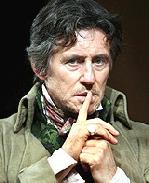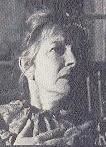SEARCH
REVIEWS
FEATURES
NEWS
Etcetera and
Short Term Listings
LISTINGS
Broadway
Off-Broadway
BOOKS and CDs
OTHER PLACES
Berkshires
London
LA/San Diego
Philadelphia
Elsewhere
QUOTES
On TKTS
LETTERS TO EDITOR
FILM
LINKS
MISCELLANEOUS
Free Updates
Masthead
Writing for us
A CurtainUp Review
A Touch of the Poet
| Everywhere the scum is rising to the top. ---Cornelius Melody responding to the news that Andrew Jackson is running for president. |

Gabriel Byrne
(Photo: Joan Marcus) |
Born into wealth in the old country, Con is a continually drunk ex-Irish officer in Wellington's army who suffered a disgrace while serving in the Peninsula Wars. His immigration to the new world has forced on him a life he cannot identify with or make a success. He has come to America with his wife Nora (Dearbhla Molloy) and daughter Sara (Emily Bergyl) only to fall upon hard times when his remote tavern fails to attract customers. Unable to cope with his loss of prestige and honor, he nevertheless strides about the tavern in his bright red military garb, pompously confusing his dreams of the past with the sad facts that define the present. Unable to show any love for Nora, his doting supportive hard-working peasant wife, he instead constantly assails her.
He berates his daughter for wanting to marry a young gentleman of means but is incensed when the boy's parents make an offer of cash to prevent the wedding. For her part, Sarah scornfully rebukes her father for his failure to face reality. The principal conflict occurs when Sara falls in love with Simon, a well-to-do American who has fallen ill and remains unseen in an upstairs bedroom. Con takes offense to the negative response by Simon's parents, notably his mother (Kathyrn Meisle) and the family attorney (Nicholas Gadsby) and affects a revenge that turns out a bit differently than he expects.
In 2005 we saw eleven major play revivals open on Broadway, including two by Tennessee Williams, O'Neill's only rival for the title of greatest American playwright. That neither Williams' A Streetcar Named Desire or The Glass Menagerie received anything close to definitive productions puts O'Neill temporarily in the lead with the current beautifully staged and acted revival of Poet. That this exemplary production, under the direction of Douglas Hughes, comes close enough on the heels of the well-received A Moon for the Misbegotten (produced during the 2,000 season) also suggests that a lot of credit must go to the dynamic portrayals by Byrne, the star of both.
As much as the late Jason Robards distinguished himself as the definitive O'Neill interpreter, may I respectfully submit that Byrne is picking up the mantle with authority, presence and perhaps even a bit more panache. It is the lightness of touch that Bryne weaves throughout his character's otherwise melodramatic excesses that validates those who consider the play, in part as a parody of The Count of Monte Cristo, the vehicle that supported Eugene's father James O'Neill, throughout his career.
In A Touch of the Poet Eugene O'Neill integrated generosity and selfishness, as only the Irish-American master of epoch-scaled blarney could do. In doing so, he created a classically structured portrait of a family bound by a love-hate relationship. Although the play needed neither flowery lyricism nor desperate dramaturgy to reveal itself as a closer look at the inner O'Neill, it is nevertheless generously full of it and happily so.
Boring moments exist in all O'Neill plays, but in A Touch of the Poet they seem to disappear quickly, often replaced in the nick of time by almost farcical situations, even as we give ourselves up to the Melody family's agonizing struggle. The fears and the bitterness that bind them also tend to reveal them as purposefully conflicted. Patience is rewarded as the slow and methodically crafted story cleverly exposes the almost humorous contradictions of Con's behavior. In this well cast and excellently staged production, the wordiness and flaws so often noticed in O'Neill's plays, are almost instantly forgotten.
Notwithstanding the contribution of director Hughes for bringing nuance and detail, relevance and clarity to this play, there is much to say about the superior quality of the performances. All reflect the obligatory melodramatics even as we respond to the humor. That there will always be room made in an O'Neill play for a few drunken incoherencies and a certain amount of vague motivation doesn't disturb the maturing O'Neill's complex consideration of Con.
Byrne stunningly brings into perspective Con's world of self-delusion and introspective digressions into the past, often while gazing narcissistically into a mirror and reciting poetry. He alternates this without a missed beat with the bombastic and arrogant verbal abuse of his wife and daughter. It is a feat that Byrne pulls of brilliantly through a finely tuned brogue. He never allows Con to become despicable or unsympathetic. His drunkenness never becomes a crutch, but an anchor he could drop at will. He remains in total control while he maneuvers in and out of every port of dreams. Humiliated at a duel of honor, Con loses the last vestiges of his dream world and seeks final refuge with his cronies at the bar (excellently portrayed by Daniel Stewart Sherman and Byron Jennings, Ciaran O'Reilly and Randall Newsome).
Bergyl is marvelously feisty as the strong-willed daughter Sarah, but she also earns our attention with a wide range of emotions that could, when necessary, be unleashed with hurricane force. As Nora, Molloy poignantly reveals a woman who could love for its own sake but never be totally shattered by its frustrations. Meisle affects a coyly insinuating layer to her performance as Simon's mother, whose proprieties are momentarily shaken by the charismatic Con. Beautifully designed (setting and costumes) by Santo Loquasto, this dramatically harmonious, immensely humorous production is a splendid and welcome addition to the Broadway season.
Editor's Note: Another O'Neill play, TheEmperor Jones, is currently enjoying a rare revival in London where it has been well enough received to extend to January 14th. To read our London critic's review go here .
| Background Notes
The original cast starred Betty Field as Deborah/Mrs. Henry Harford, Helen Hayes as Nora Melody, Eric Portman as Cornelius Melody and Kim Stanley as Sara Melody. In addition to the original production, there have been two revivals. The first, by the American National Theater and Academy which played 5 performances ( 5/2/67 to 5/13/67 ) in repertory with The Imaginary Invalid and Tonight at 8:30) at the ANTA Playhouse and starred Denholm Elliott, Priscilla Morrill, and Jeanne Hepple, under the direction of Jack Sydow. The first major Broadway revival starred Jason Robards, Geraldine Fitzgerald, and Katherine Walker under the direction of Jose Quintero. It played at its original home, Helen Hayes Theater for a total of 141 performances (2/28/77 to 4/30/78).. For more about Eugene O'Neill, including links to other plays reviewed at CurtainUp, see the O'Neill page in our playwright's album. A two-hour documentary about O'Neill, written by Arthur and Barbara Gelb, authors of O'Neill: Life With Monte Cristo, is scheduled to air on PBS 3/27/06. ---Elyse Sommer |
| A TOUCH OF THE POET Playwright: Eugene O'Neill' Directed by Doug Hughes Cast: Gabriel Byrne (Cornelius Melody), Dearbhla Molloy (Nora Melody), Emily Bergl (Sara Melody), John Horton (Nicholas Gadsby), Byron Jennings (Jamie Cregan), Kathryn Meisle (Deborah), Randall Newsome (Paddy O'Dowd), Ciaran O'Reilly (Dan Roche), Daniel Stewart Sherman (Mickey Maloy) and David Power (musician, uilleann pipes). Set and Costume Design: Santo Loquasto Costume Design: Lighting Design: Chris Akerlind Sound Design & Original Composition: David Van Tieghem Running time: Running Time: 2 hrs 45 minutes including one intermission Roundabout at Studio 54, (212) 719-1300. www.roundabouttheatre.org From 11/11/05 to 1/29/06; opening 12/06/05. Tue to- Sat at 8pm; Wed, Sat & Sun at 2pm; Dec 13 to Dec 23, then Tue to Sat at 7pm; Wed, Sat & Sun at 2pm Tickets: $26.25 - $86.25 Reviewed by Simon Saltzman based on December 7th press performance |

Easy-on-the budget super gift for yourself and your musical loving friends. Tons of gorgeous pictures.

>6, 500 Comparative Phrases including 800 Shakespearean Metaphors by our editor.
Click image to buy.
Go here for details and larger image.









